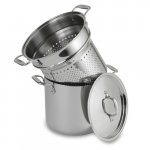This is probably common knowledge to most regulars, but I’ve seen some confusion about this elsewhere, so I figured I’d post it here as an interesting factoid of sorts.
When using a rolling boil in an open pot to cook pasta (or other starchy foods like rice), the water can boil over. You can stop this from happening by adding a splash of oil to the pot.
Many instinctively do this because “they have always seen it done that way” , but a lot of people believe they are adding the oil to coat the pasta (spaghetti for instance) to keep it from sticking together. Not true. Very little if any of the oil actually gets on the pasta.
Instead, the oil breaks the surface tension of the water which disallows a starch “bubble” to form. Basically, the oil swirls around and “pops” the starch bubble before it can form.
Maybe we need a "Techniques" forum somewhere for more tips?
When using a rolling boil in an open pot to cook pasta (or other starchy foods like rice), the water can boil over. You can stop this from happening by adding a splash of oil to the pot.
Many instinctively do this because “they have always seen it done that way” , but a lot of people believe they are adding the oil to coat the pasta (spaghetti for instance) to keep it from sticking together. Not true. Very little if any of the oil actually gets on the pasta.
Instead, the oil breaks the surface tension of the water which disallows a starch “bubble” to form. Basically, the oil swirls around and “pops” the starch bubble before it can form.
Maybe we need a "Techniques" forum somewhere for more tips?






